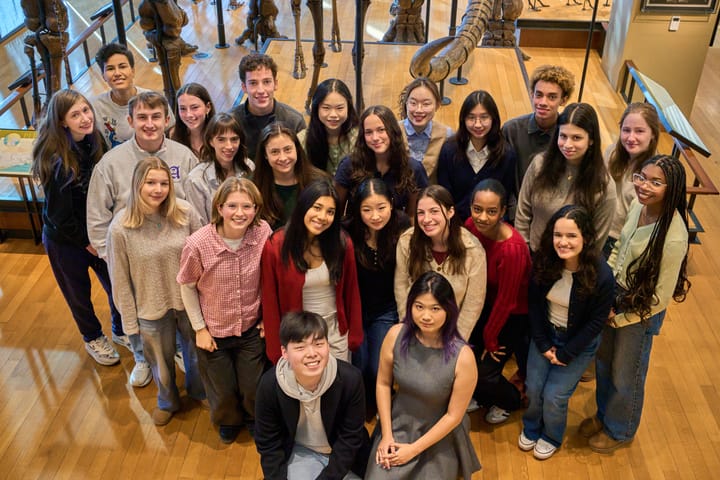Faculty, Staff Navigate Childcare in Amherst
While the college offers childcare support and resources, a lack of accessible childcare in the area, exacerbated by the high demands of working life at the college, creates challenges for many parents.

The choice to have a child may result in a rewarding, life-changing experience — but it’s also a very difficult one, especially for parents working full-time. While the college does offer support and resources, a lack of accessible childcare in the Amherst area, exacerbated by the high demands of working life at the college, creates challenges for many parents.
National data shows that the brunt of the responsibility for childcare falls on women, a labor imbalance only exacerbated by the Covid pandemic. This childcare imbalance has been shown to increase the economic gender gap.
I spoke with three faculty and staff members who are mothers — Emily Tareila (program director of the Charles Hamilton Houston Internship Program), Marcela Murillo Robinson (assistant director for data analytics and operations), and Jallicia Jolly (assistant professor of American studies and Black studies) — to find out how they achieve that crucial balance between work and child-raising, how the college helps them do so, and what the college can do to support them further.
Parenthood sparks a fundamental shift in priorities. The care and attention a baby demands is neverending, and sleep deprivation is all but guaranteed. Between working at the college and raising a child, there simply isn’t much time for anything else. Tareila, mother of nine-month-old Sandy, remarked, “One of the hugest benefits of working at a really vibrant, intellectually rich, and engaging college is being able to go to all these amazing events … I really value and love the opportunities to go to evening events. And right now, that’s not really in the cards for me.” For Tareila, parenthood is a tradeoff worth making, but a tradeoff nonetheless.
For Robinson, too, parenthood has been a rewarding tradeoff. She has a lot going on; when her now two-year-old Lorenzo was an infant, she transitioned to a new professional role. Making such significant adjustments was naturally a lot to handle, which she acknowledges. “Sometimes it’s hard on me, and it gets frustrating,” she said.
To deal with that frustration, though, she has outlets: “So it’s important for me to have that run one day or go to my yoga class.”
For Jolly, mother of two-year-old Rose, part of parenthood as a researcher and professor is unlearning overbearing work habits that have built up over the years. “You’re really socialized to be researching, writing, working all the time and [to] make little room for joy, or holistic wellness, or engagement with the world beyond simply the lens of work baselines,” she said. “[I’m] being really thoughtful about the time that I’m taking off to pour into the other parts of my identity that need to be filled, so that I can be well rounded, and not just simply, you know, a great researcher, or a great academic.”
The college’s parental leave policy corresponds with relatively progressive Massachusetts state policy, allowing employees to take off up to 12 weeks of paid leave. With the way it usually lines up, the college lets faculty take a full semester off. The policy isn’t gendered, allowing for both new mothers and fathers to take significant time off. All three interviewees took advantage of the parental leave policy, taking a semester off to focus on family.
Raising a child is much more than a one-semester job, though. In many ways, the greatest challenges begin once parents return to work. A key component of returning to work is finding people to care for your child, usually in the form of a local childcare center. The college partners with Woodside Children’s Center, a local daycare right in town, to provide preferential admissions to faculty and staff.
Despite that preference, however, landing a spot at Woodside can seem unattainable to some.
Robinson, for one, could not get Lorenzo in at Woodside.“We have been on the waitlist for a year and a half,” she explained. “And he’s not getting in anytime soon.” It’s especially frustrating since it’s right down the street, too, she said.
Tareila has had a similar experience. She tried to get her nine-month-old son, Sandy, into Woodside, but thinks she never really stood a chance. “Woodside, you know, would have been terrific since I could walk there from here,” she said. “But I applied there in September [2022]. And when I checked in to see the status of my application, they let me know that there were six families ahead of us for the room, and I never heard anything from them again.”
Sue Dexter, Woodside’s director, echoed the same frustrations articulated by those applying to the daycare. “We’re only licensed for seven infants and nine toddlers,” she said. “So that’s not a lot of space.”
Even with the preference for Amherst employees, there is simply too much demand for the supply. While the waitlist has over 100 members, these families have a very low chance of getting in, let alone within a year, Dexter said.
“At this point, unless they really insist, we’re not even going to accept the application just because I feel like I don’t want to take their money,” she said.
What would allow Woodside to become more accessible is physical expansion, something the college could assist with, Dexter said. “We need a new building, because if we had a new building, we could get just one more classroom and it would keep things moving a little bit quicker for families.”
Dexter thinks that the college could play an integral role in Woodside’s expansion. “I would like to keep hope that as the need for childcare for Amherst College families grows, the need for a new, larger building/school becomes an important part of Amherst’s future,” she said.
For many faculty and staff, too, diverse representation in childcare is an important consideration. “I’m raising a Black child, a Black girl, in a predominantly white community in Western New England, elite Massachusetts,” Jolly said. “And so I’m being really intentional about how I’m cultivating those communities and how I am exposing her to really cultural knowledge and resources that affirm her humanity and build her dignity.”
Jolly added, “The institution needs to expand its approach to childcare — both the provisions of childcare and the equity-related issues surrounding it.”
One way to help achieve this goal, Robinson suggested, is for the college to create an organization for faculty and staff with young kids where they can come together to share resources and build community. Some benefits offered to faculty and staff by the college — like a free subscription to care.com, a service providing short-notice childcare — may be easy to miss on the Amherst website. With a community group, everyone stays up to date on resources.
Another important issue for many who work on campus is breastfeeding. Tareila mentioned that despite all of the support she has received from the college, she lamented that the options for spaces to breastfeed are underwhelming.
While there is a lactation room in Frost Library, people who breastfeed often have to go to a normal bathroom, which Tareila said is less than ideal. The facilities are not meant for pumping, she pointed out, and if there is somebody already in the bathroom, one basically has no option other than to wait, and potentially miss the window.
“Other colleagues I know had to go to a weird random office somewhere [to breastfeed],” Tareila said. “I really wish that I didn’t have to use the public sink.”




Comments ()